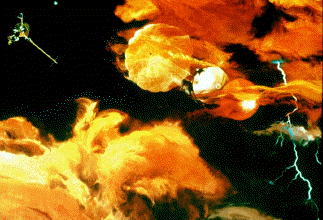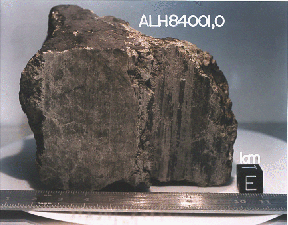These dolphins are at the peak of their jumps!
Click on image for full size
Windows Original, adapted from Corel Photography
Dolphins
Dolphins are known as cetaceans and are in the order Cetacea. The name Cetacea comes from the Latin 'cetus', which means large marine creature or sea monster!
Dolphins are mammals and they do live their entire lives, from birth to death, under water. Because they live their whole lives under water, dolphins have to be great swimmers. They use their body flex and powerful tail flukes for their main propulsion.
Dolphins can also jump out of the water. You might have seen them jump really high and dive to great depths in the ocean or at a zoo or wildlife park.
Dolphins use echo location to "see". Some dolphins may be completely blind, but they can detect prey or other dolphins in their pod, by making noises and using the echo to tell how far away something is. You may have heard these noises as clicking sounds.
Dolphins have strong social ties to other dolphins in their pod. They swim together for feeding and protection purposes. Humans have disrupted dolphin life by catching dolphins for wildlife shows or catching dolphins in fishing nets. This not only disrupts dolphin life, but disrupts the entire ocean food chain.
You might also be interested in:

Jupiter's atmospheric environment is one of strong gravity, high pressure, strong winds, from 225 miles per hour to 1000 miles per hour, and cold temperatures of -270 degrees to +32 degrees (freezing temperature).
...more
In July, 1996, it was announced that Dr. David McKay, along with a team of scientists at Johnson Space Center (a division of NASA), had discovered possible fossils of bacteria in an ancient rock from Mars.
...more
Saturn's atmospheric environment is one of strong gravity, high pressure, strong winds, from 225 miles per hour to 1000 miles per hour, and cold temperatures of -270 degrees to +80 degrees. With winds
...more
Titan's atmosphere is a lot like the Earth's, except that it is very cold, from -330 degrees to -290 degrees! Like the Earth, there is a lot of Nitrogen and other complex molecules. There also may be an
...more
Autotrophs are organisms that produce organic compounds from an inorganic source of carbon (carbon dioxide) given a source of energy. If the source of energy is the reactions of inorganic chemical compounds,
...more
In the warm primordial ocean, aggregates of amino acids, proteins, and other hydrocarbons coalesced into a form called *coacervates*. Organic polymers such as amino acids will spontaneously form coacervates
...more
Organisms that are able to make their own food (in the form of sugars) by using the energy of the Sun are called autotrophs, meaning "self-feeders". Photosynthesis is the name of the process through which
...more














